On Sunday, the 5th of January 2020, the US military command for Africa, AFRICOM, confirmed an attack by Al-Shabab, an Al-Qaeda partner Islamist militant group, on the Kenya Defense Force military base in the popular coastal region of Lamu, Kenya.
According to a statement released by AFRICOM, the attack was an attempt to breach security at Manda Air Strip but it was repulsed and the airfield, cleared, with U.S. Africa Command working together with Kenyan forces. The Kenya Defense Forces further confirmed this in a tweet, adding that the bodies of four terrorists were found. A U.S. service member and two Defense Department contractors were also killed from the attack.
Al-Shabab has claimed responsibility for the attack, saying it killed nine Kenyan soldiers and wounded 17 members of the US forces. The group also claimed that the attack destroyed seven aircraft and three military vehicles.
This marks the first known al-Shabab attack against the U.S. in Kenya. The group has been the target of a growing number of U.S. airstrikes in Somalia and this particular attack has become a basis for the U.S to fight the Al-Shabab group, known to be one of the world’s most resilient extremist organizations. The attack also sends a strong message to the U.S while demonstrating a new capability by Al-Shabab. It is also telling on the effectiveness of the US campaign against the group.
However, a major source of concern is the implication of this attack on Kenya’s tourism industry since the attack took place in the popular tourist destination of Lamu Island. Tourists are less likely to visit insecure areas or conflict zones. Hence, there is a possibility that the Kenyan tourism sector would experience a decline in activities and consequently revenue for a certain period of time.
Having carried out several attacks in the region since it was formed over 10years ago, Al-Shabab has vowed to retaliate Kenya’s decision to send its troops to fight them in Somalia in 2011. Since then, the Jihadist group has committed more than 150 attacks on Kenyan soil stepping up attacks in the East African country in recent weeks.
A few days before the January 5th attack, the terrorist group claimed responsibility for an open fire attack on a bus convoy in Kenya which resulted in the death of four people.
According to the Lamu County Commissioner, Irungu Macharia, the terrorists were said to have rained gunshots at a convoy of three buses and two vans that were being escorted by the police to Lamu. Three passengers were shot dead as well as a conductor in one of the buses. While two other passengers were injured.
Andrew Franklin, a Security analyst says the Kenyan government is not adequately addressing the rising threat to security. In his words, “There is a low-intensity conflict going on and the government officials are not treating the situation with the seriousness it deserves”.
Given the recurrent attacks on the region and the extent of these attacks, the Al-Shabab jihadist group remains “a potent threat” to regional security with a possibility of an escalation to other neighbouring states.
Also, with the laxity of the Kenyan government towards the activities of the jihadist group and its strong quest for retribution on Kenya, it poses a serious threat to the sovereignty of the Kenyan state and her citizens and questions the ability of the state to provide the very needed protection for her citizens.
On the part of Somalia, Al-Shabab’s continued attacks demean the ability of the Somalian government to ensure security for her citizens as well as provide a sustainable solution to the dire humanitarian crisis in the country. Also, its influence in Somalia undermines the United States’ efforts to prevent the use of Somalia as a refuge for international terrorists.
Written by Synka JyteDavis








